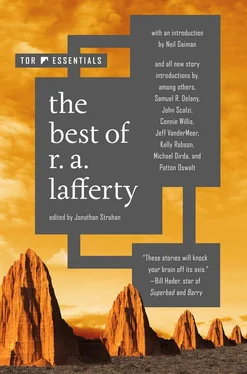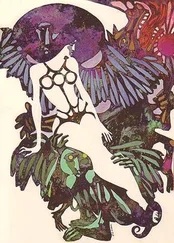This is one of the stories responsible for the notion that Lafferty was principally influenced by American tall tales. It’s true that he accomplished a great deal of his effects using deadpan narration of wondrous events. Also that he pretty much ignored the internal psychology of his characters. Henry James he wasn’t. If a man’s possessions were taken away from him, Lafferty had him throw back his head and lament this fact in words. If a woman lost interest in an enterprise, he indicated it by having her say exactly that. So, yes, the assertion is, in part, valid.
But a lot of people have written modern-day tall tales and not one of them has come close to writing like the Bard of Tulsa. Consider such digressions as Clarence Little-Saddle’s riff on the significance of the war bonnet and the lecture on how much larger the moon appears at the horizon than overhead. Consider his beautiful use of dialect. Consider his lovely comic asides and delightful parodies of scientific argot. Tall tales are nothing if not straightforward. “Narrow Valley” is anything but. This is a sophisticated work, written by a sophisticated man.
You can tell a lot about a writer by what he chooses to celebrate. There is a grim backstory underlying this tale and Lafferty, who knew Oklahoma history inside and out, was well aware of it. In the early seventeenth century, there were sixty thousand Pawnee in possession of a great deal of land and by 1875 … well, you can read that for yourself in the opening sentence. But “Narrow Valley” is, almost paradoxically, one of Lafferty’s sunniest works, a comedy, and a paean to resilience and human decency.
It’s also, as I said, easy to like. You’ll see.
In the year 1893, land allotments in severalty were made to the remaining eight hundred and twenty-one Pawnee Indians. Each would receive one hundred and sixty acres of land and no more, and thereafter the Pawnees would be expected to pay taxes on their land, the same as the White-Eyes did.
“Kitkehahke!” Clarence Big-Saddle cussed. “You can’t kick a dog around proper on a hundred and sixty acres. And I sure am not hear before about this pay taxes on land.”
Clarence Big-Saddle selected a nice green valley for his allotment. It was one of the half dozen plots he had always regarded as his own. He sodded around the summer lodge that he had there and made it an all-season home. But he sure didn’t intend to pay taxes on it.
So he burned leaves and bark and made a speech:
“That my valley be always wide and flourish and green and such stuff as that!” he orated in Pawnee chant style. “But that it be narrow if an intruder come.”
He didn’t have any balsam bark to burn. He threw on a little cedar bark instead. He didn’t have any elder leaves. He used a handful of jack-oak leaves. And he forgot the word. How you going to work it if you forget the word?
“Petahauerat!” he howled out with the confidence he hoped would fool the fates.
“That’s the same long of a word,” he said in a low aside to himself. But he was doubtful. “What am I, a White Man, a burr-tailed jack, a new kind of nut to think it will work?” he asked. “I have to laugh at me. Oh well, we see.”
He threw the rest of the bark and the leaves on the fire, and he hollered the wrong word out again.
And he was answered by a dazzling sheet of summer lightning.
“Skidi!” Clarence Big-Saddle swore. “It worked. I didn’t think it would.”
Clarence Big-Saddle lived on his land for many years, and he paid no taxes. Intruders were unable to come down to his place. The land was sold for taxes three times, but nobody ever came down to claim it. Finally, it was carried as open land on the books. Homesteaders filed on it several times, but none of them fulfilled the qualification of living on the land.
Half a century went by. Clarence Big-Saddle called his son.
“I’ve had it, boy,” he said. “I think I’ll just go in the house and die.”
“OK, Dad,” the son Clarence Little-Saddle said. “I’m going in to town to shoot a few games of pool with the boys. I’ll bury you when I get back this evening.”
So the son Clarence Little-Saddle inherited. He also lived on the land for many years without paying taxes. There was a disturbance in the courthouse one day. The place seemed to be invaded in force, but actually there were but one man, one woman, and five children. “I’m Robert Rampart,” said the man, “and we want the Land Office.”
“I’m Robert Rampart Junior,” said a nine-year-old gangler, “and we want it pretty blamed quick.”
“I don’t think we have anything like that,” the girl at the desk said. “Isn’t that something they had a long time ago?”
“Ignorance is no excuse for inefficiency, my dear,” said Mary Mabel Rampart, an eight-year-old who could easily pass for eight and a half. “After I make my report, I wonder who will be sitting at your desk tomorrow.”
“You people are either in the wrong state or the wrong century,” the girl said.
“The Homestead Act still obtains,” Robert Rampart insisted. “There is one tract of land carried as open in this county. I want to file on it.”
Cecilia Rampart answered the knowing wink of a beefy man at the distant desk. “Hi,” she breathed as she slinked over. “I’m Cecilia Rampart, but my stage name is Cecilia San Juan. Do you think that seven is too young to play ingénue roles?”
“Not for you,” the man said. “Tell your folks to come over here.”
“Do you know where the Land Office is?” Cecilia asked.
“Sure. It’s the fourth left-hand drawer of my desk. The smallest office we got in the whole courthouse. We don’t use it much any more.”
The Ramparts gathered around. The beefy man started to make out the papers.
“This is the land description,” Robert Rampart began. “Why, you’ve got it down already. How did you know?”
“I’ve been around here a long time,” the man answered.
They did the paperwork, and Robert Rampart filed on the land.
“You won’t be able to come onto the land itself though,” the man said.
“Why won’t I?” Rampart demanded. “Isn’t the description accurate?”
“Oh, I suppose so. But nobody’s ever been able get to the land. It’s become a sort of joke.”
“Well, I intend to get to the bottom of that joke,” Rampart insisted. “I will occupy the land, or I will find out why not.”
“I’m not sure about that,” the beefy man said. “The last man to file on the land, about a dozen years ago, wasn’t able to occupy the land. And he wasn’t able to say why he couldn’t. It’s kind of interesting, the look on their faces after they try it for a day or two, and then give it up.”
The Ramparts left the courthouse, loaded into their camper, and drove out to find their land. They stopped it at the house of a cattle and wheat farmer named Charley Dublin. Dublin met them with a grin which indicated he had been tipped off.
“Come along if you want to, folks,” Dublin said. “The easiest way is on foot across my short pasture here. Your land’s directly west of mine.”
They walked the short distance to the border.
“My name is Tom Rampart, Mr. Dublin.” Six-year-old Tom made conversation as they walked. “But my name is really Ramires, and not Tom. I am the issue of an indiscretion of my mother in Mexico several years ago.”
“The boy is a kidder, Mr. Dublin,” said the mother Nina Rampart, defending herself. “I have never been in Mexico, but sometimes I have the urge to disappear there forever.”
“Ah yes, Mrs. Rampart. And what is the name of the youngest boy here?” Charley Dublin asked.
“Fatty,” said Fatty Rampart.
Читать дальше




![Рафаэль Лафферти - Дни, полные любви и смерти. Лучшее [сборник litres]](/books/385123/rafael-lafferti-dni-polnye-lyubvi-i-smerti-luchshe-thumb.webp)
![Рафаэль Лафферти - Лучшее [Сборник фантастических рассказов]](/books/401500/rafael-lafferti-luchshee-sbornik-fantasticheskih-ra-thumb.webp)